Those things we’ve experienced ourselves inevitably shape what we write about. I’ve had many experiences that are uncommon–which I’d say is a mixed blessing, because while many of those events were horrible, all of them give me interesting things to write about. And one personal story relates to a serial killer, which I’m about to share here.
When I graduated with a BA in âModern Foreign Languageâ from Metropolitan State College of Denver in 1995 (I studied Spanish, French, and German), I felt I had enough of living in Colorado. Though for me, âColoradoâ was actually the Denver metropolitan area, the specific place in “the Rocky Mountain state” where I lived. Iâd had enough of traffic, enough smog, enough bad driving in Denver the first serious snowfall of every winter, enough crime, etc. Etc.
I was eager to get back to my home state, Montana, which I was to a degree seeing through rose-colored glasses after 6 ½ years in CO. I mean, after all, it was a lack of a job in MT due to a generally poor economy there that had been one of my prime motivations for moving to Colorado in the first place.
In a combination of that rose-colored view along with some Evangelical idealism, I decided I would start a Christian school in Montana. Not that Iâd ever taught full-time. Or even been certified as a teacher. Or had been an administrator. But I had energy, plans, and a lot of optimism (and an innate risk-taking personality).
Note that my plans included a lot on curricula and what to teach and how, but not a lot on how to pay the bills to make ends meet. So, after 2 years, the school I began in Dillon, Montanaâpicking that town not because I had ever lived there before, but because my brother-in-law was a pastor thereâclosed down due to a lack of funds. Sad for me, but true.
So, paying the bills for my family after that time meant working what jobs were available. Since Iâd been trained as a medic in the Army, my best paying opportunity in Dillon was to work in a nursing home as a CNA, Certified Nurse Assistant, a.k.a. an orderly, a.k.a. a professional bottom-wiper. ?
My last comment reveals some of my humor about what I didâI actually did hate it at first, in part because of a sense of pride in how supposedly bright I am with so many big ideas, and there I was doing that. While failing at the school taught me some of the humility I was lacking (some, because I can always use some more humility), working at the nursing home eventually had an even stronger positive effect on me.
I learned how to really love people in a way I’d never experienced before. To show kindness. To extend mercy.
The nursing home industry (and the nursing profession in general) was and still is dominated by women. I was one of the few men to work as a CNA in Dillon, Montana. And the one clear advantage I had over every woman I ever worked with as a Nurse Aid was I could lift more weight with less strain. Very handy when dealing with heavy patients.
So after working there for three years or so (I spent five years total working in a nursing home and as a home health aid in Dillon), I sometimes was put on a shift for the sole purpose of giving baths. I could get nursing home residents in and out of the tub quicker, with less risk to me and less risk to the resident than pretty much anyone else who worked there.
Bathing residents was a different experience that working the nursing home floor–there, we CNAs were usually in pairs and most of the rooms had multiple people in them. It was not all that often that I was truly alone with a patient. But in the room I bathed patients, we were there by ourselves, the resident and I, with a type of bath that had jacuzzi jets. Nobody outside heard anything we said in there.
One of the residents in the nursing home had the exact same name as an entertainer who had been famous in the early part of the 20th Century (and he’s still a household name). He of course joked about his name often. For the sake of telling this (true) story, let me call him “Jimmy”–which wasn’t his actual name, but was close enough.
I was giving Jimmy a bath and he’d mentioned to me previously that he was a veteran of World War II. And since I had learned to engage the people I worked for in conversation and to get to know them as people (and also was curious about the Second World War), I was asking Jimmy questions about his war experience, where he had been, what it had been like, things like that.
Jimmy wasn’t extremely talkative with me in general, but after a bit on that particular evening, he opened up and spoke about his time in France, including shortly after the Germans were defeated there. I don’t in fact remember his exact words, but I’m going to recreate something he eventually said as best as I can recall it:
“So you know that after the war, we realized that a lot of those French girls had been with the Germans.” He said all this in a gruff, raspy voice shaped by decades of smoking (the consequences of which eventually killed him).
“Ah, yeah, I suppose they were…you know, doing what it takes to make it in the world. But how did you know for sure?”
“Well, I slept with one of them French girls. And afterwards I saw she had a whole bunch of jewels. And those French people were so poor then, I knew she had to have been with one of them Germans. They gave her the jewels.”
“So then what happened?”

Not what “Jimmy” looked like, but close enough. (Russian serial killer Mikhail Popkov, image credit, www.rt.com)
“I killed her! Strangled her. And then I took the jewels.”
I didn’t know what to say. Though I imagine my mouth was open.
“Yeah, she had it coming, helping those damn Jerries! But then I found other girls the same as her. Those that had no jewels I knew were good, but the rich ones I knew had been collaborating with the Germans. So I killed them. And took their jewels. But they deserved it!”
I still had no words.
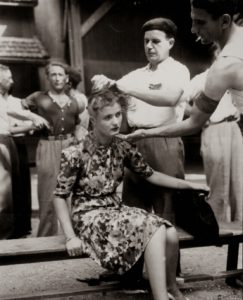
Public sentiment against women who had consorted with Germans ran high in France in 1944. The typical response though was to forcibly shave their heads, so they’d be known in public. Image credit: rarehistoricalphotos.com
“When I come home, I had a whole duffel bag full of jewelry. And when my folks saw it, they wondered where I got all those jewels. When I told ’em I killed French girls to get them, they looked at me, eyes all wide.” He demonstrated a shocked expression. “But then I told them what them girls had done. And they said, ‘Well all right then–if they were sleeping with Germans, then it was okay. You did good.'”
Then he looked at me. Stared at me. I think he was waiting for me to tell him I thought it was all right, too.
Some part of my mind was wondering if he was really telling a true story. But there was absolutely no reason for him not to tell me the truth. Nothing to gain from this kind of lie. But if I were to offer him understanding as a military man myself (at that point I was already a veteran of the Gulf War and had mentioned that to him), then, well then the conversation had a purpose, a reason. Only if it were true.
I’ve been rather confrontational in my life, speaking truth when it isn’t pleasant, often enough to have had a reputation for it. But I became that way moreso after this particular encounter than I was beforehand. At that particular moment, I said something like (with a dry mouth):
“Well, Jimmy, it’s time to get you out of that tub.” And that’s what I did, got him out of there. And I toweled him off and dressed him and took him back to his room, him for a change speaking more than me, I having fallen silent.
But then I thought about what he told me. Should I tell someone? But who would I tell and how? And was there even a purpose in telling? Jimmy was only a few years from his death (which yes, was pretty evident at the time).
So in the end I did nothing. I didn’t even tell anyone in the nursing home about it. I’m not even really telling them now, even if one of them should read this, because there were two male residents in that place and during that time who had the exact same name as a famous entertainer of the past.
I’m not sure even now why I’m not saying his actual name. It might be because of his family–his children and grandchildren and great-grandchildren. Should they actually know? But couldn’t they just say they didn’t believe me if they heard?
How many more crimes have been covered up by simple inaction? People not knowing what to say or do. Even people who are normally bold risk-takers like me.
And how common is this sort of thing? How many other ordinary-seeming people have in fact committed horrific crimes? More than most people suspect, I think. Because even most people who do evil know it’s evil and cover it up–or seek to justify it. (Though in fact it’s almost always easier for people to do wrong when they have something to personally gain from evil–in Jimmy’s case, easier to kill and take the jewels than simply kill. And it’s also easier to do evil against people the public looks down upon.)
Note I’m not against portraying evil–I think some of my remarks two weeks ago about the way evil can affect people when portrayed, when normalized, seem to have been mistaken for me saying I am against ever portraying evil. No, I’m fine with showing evil as it is–just not with pretending evil is not evil, for the sake of justifying ourselves (as even Jimmy did). For what it’s worth, I hope my slice-of-life true account benefits someone. At least those of you who sit down to write fictional stories which may include serial killers.
But benefiting others honestly isn’t the only reason I’ve written this. Because like “Jimmy” himself, I’ve been holding onto that story for a while now…




































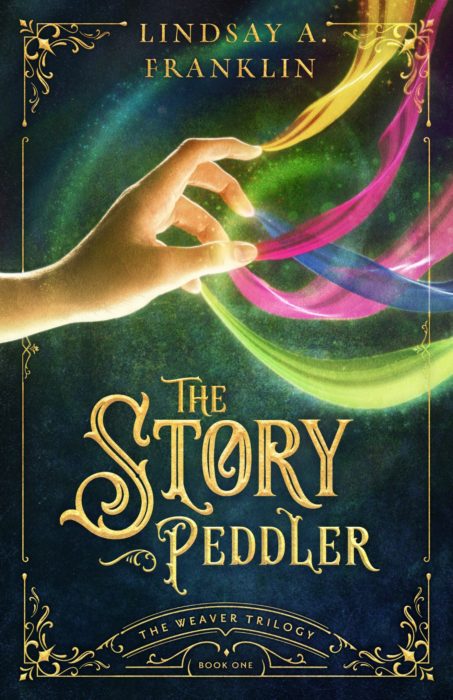
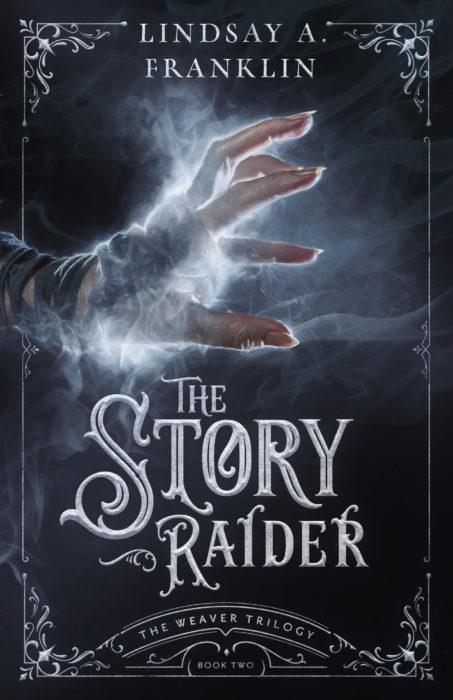 Shortly after The Weaver Trilogy was contracted, my editor and I had a discussion about the booksâ titles. He loved my title for book one, The Story Peddler, and wanted each book in the series to contain the word âstory.â That was the magic of the concept, after all.
Shortly after The Weaver Trilogy was contracted, my editor and I had a discussion about the booksâ titles. He loved my title for book one, The Story Peddler, and wanted each book in the series to contain the word âstory.â That was the magic of the concept, after all.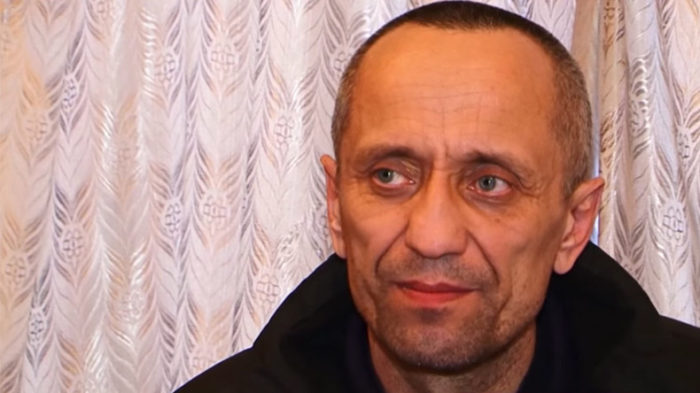




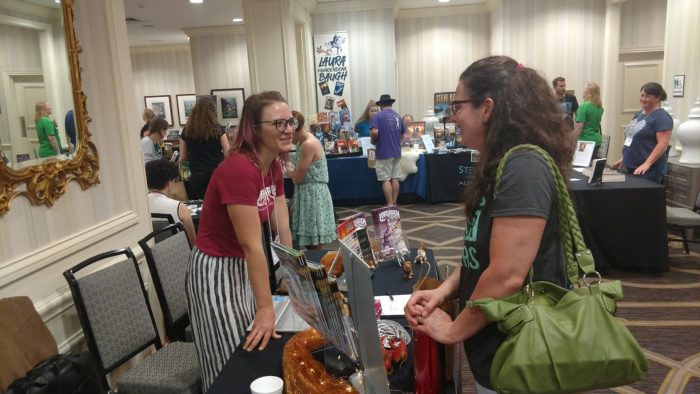
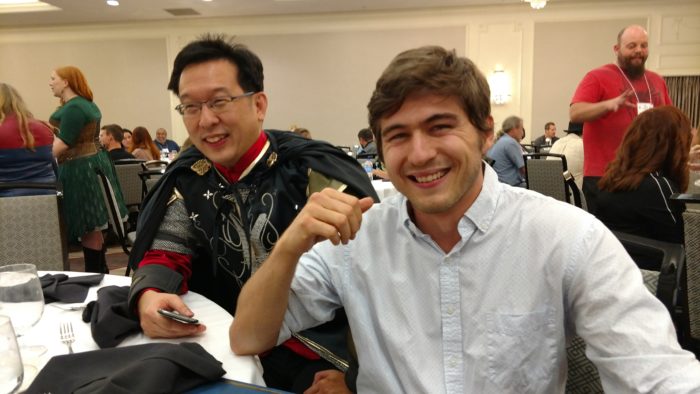
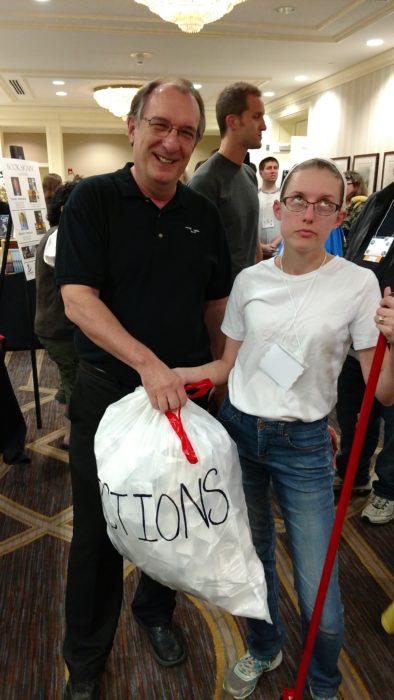

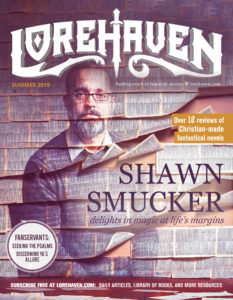
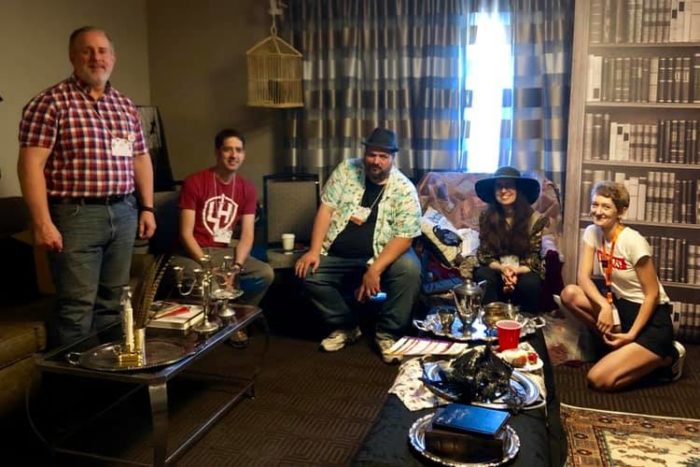
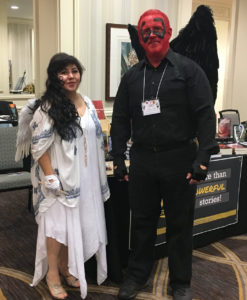

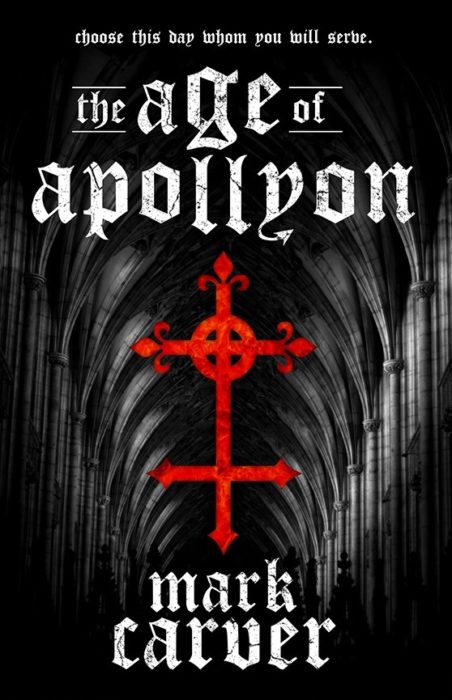
 I am the author of The Age of Apollyon Trilogy, a series that imagines a world where the devil has physically revealed himself while God remains silent. Satanism becomes the dominant world religion and the protagonist of the story is a practicing Satanist.
I am the author of The Age of Apollyon Trilogy, a series that imagines a world where the devil has physically revealed himself while God remains silent. Satanism becomes the dominant world religion and the protagonist of the story is a practicing Satanist.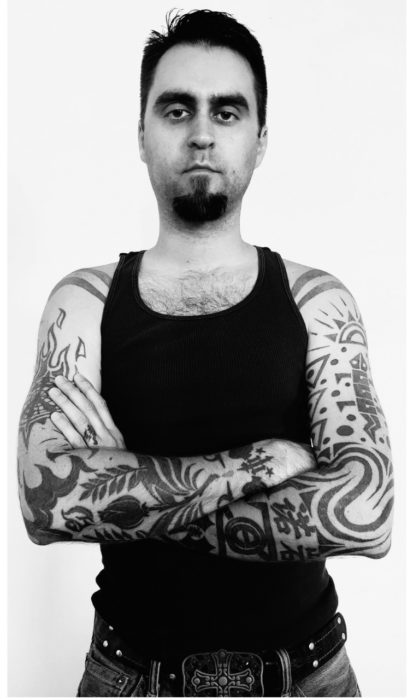
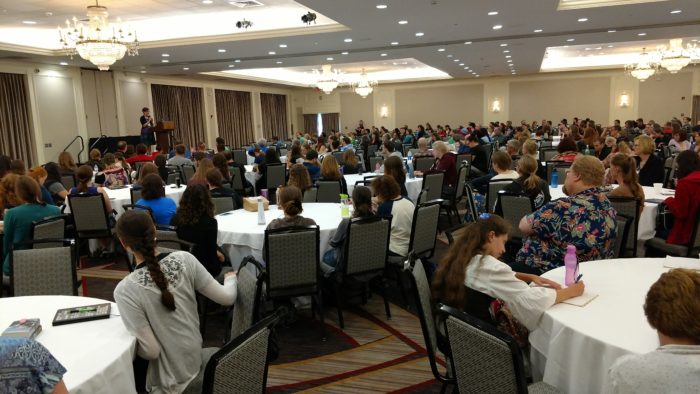
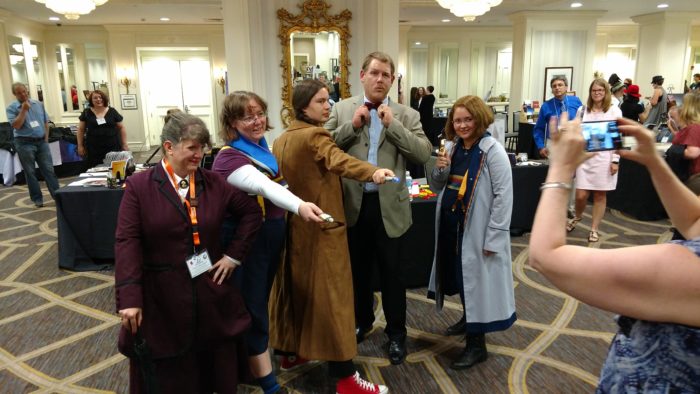 The Realm Makers costume banquet. This here is how you do God-exalting cosplay. (I nearly typed that as a rather cheesy evangelical-Freudian slip, gosplay.) It’s fandom, it’s fun, it’s creative, and it’s all based in fellowship and inclusion.
The Realm Makers costume banquet. This here is how you do God-exalting cosplay. (I nearly typed that as a rather cheesy evangelical-Freudian slip, gosplay.) It’s fandom, it’s fun, it’s creative, and it’s all based in fellowship and inclusion.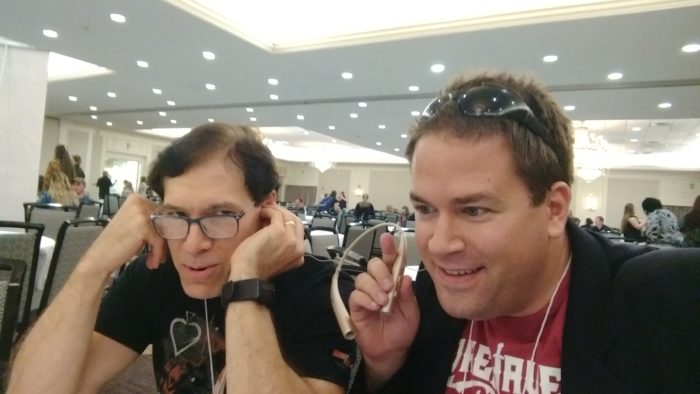 Kerry Nietz and Steve Rzasa, two original Enclave authors and first-rate science-fiction crafters. I’m happy to count them both as friends and colleagues in this expanding mission to share, and create, excellent fantastical stories for the glory of God.
Kerry Nietz and Steve Rzasa, two original Enclave authors and first-rate science-fiction crafters. I’m happy to count them both as friends and colleagues in this expanding mission to share, and create, excellent fantastical stories for the glory of God.


